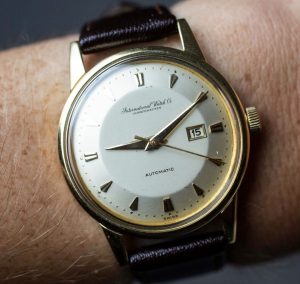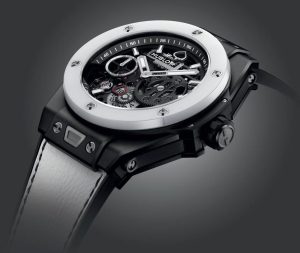
I consider the introduction of the Audemars Piguet Royal Oak in 1972 to be one of the most important turning points in the evolution of wristwatches in the 20th century. Until then, there were mainly what we might now refer to as vintage perfect replica watches (traditional in style).
They were pretty but (dare I say) boring. We collected them (and many still do), but by and large, they are now out of date.
That’s why we call them vintage 1:1 online fake watches. They didn’t disappear in 1972 but flooded the market in the 1970s and 1980s. Just as pocket watches continued to be offered on the market for decades after wristwatches became very popular in the mid-1910s,
Two things are important to consider. Firstly, it’s a groundbreaking event in luxury watchmaking to create a stainless steel sports watch as valuable (and now often more valuable) than a solid gold dress watch.

And secondly, the original Royal Oak is still perceived as a contemporary watch today. I think we’d all love to wear a historic Royal Oak Ref. 5402, and not just because of the enormous prices achieved by the Royal Oak at auctions and on the secondary market recently.
Why all this fuss about the Royal Oak the title is about the anniversary editions of the Royal Oak Offshore (ROO), a watch from a different era?
The point I’m trying to make is that the introduction of the Royal Oak Offshore was as much of a turning point in the history of modern high quality UK replica watches as the original Royal Oak was.
First, the ROO was again a game changer for the entire industry. Truly significant progress doesn’t usually lead to noticeable change in a day or even in a year.
The Royal Oak Offshore proved to be a harbinger of a shift in public interest towards watches with distinctive, eye-catching designs, characterized by increased robustness and durability. In short, it’s a spectacular sports watch.
Secondly, the Royal Oak Offshore was very large for the time. While 42 mm is considered normal today, in 1993 the standard for classic men’s copy watches for sale was 34 to 36 mm, and for men’s sports watches it was mostly 36 to 38 mm.
Back in 1997 when the Patek Philippe Aquanaut Ref 5060A, the sporty version of a Nautilus, was launched, it had a 35.6mm case. That was followed in 1998 by the Ref 5065 with a 38.8mm case, and the Aquanaut Ref. 5167 with a 40.8mm case didn’t appear until 2007!
Also launched at the same time as the ROO in 1993 was IWC Schaffhausen’s collection, which celebrated the brand’s 125th anniversary. It featured Ref. 5441, a classic 42mm men’s watch that we’d now call a vintage reedition, and a flagship model, the ultra-complicated 42.2mm Il Destriero Scafusia.
Two years earlier, Jean-Claude Biver unveiled the Blancpain 1735 Grande Complication, the world’s first Grande Complication wristwatch (which is even more complicated than tradition dictates due to the tourbillon and automatic winding) that was also 42 mm.
Those two models and the ROO seem to be all of the 42mm case Swiss made replica watches from well-known brands available in 1993.
And not to forget the 40mm Rolex Sea-Dweller Ref. 16600, which according to legend, was put on the table by Emmanuel Gueit, the designer of the Offshore, as a final argument to convince the Audemars Piguet management that the 42mm watch would definitely find a market.
Looking at a 40mm+ watches from this era, it’s clear that the testosterone-charged, aggressively sporty ROO was like no other. It retained the DNA of its ancestor, the ‘Jumbo’, but the youngster’s character is different.
The early Offshore was quickly dubbed ‘The Beast’, although it seems more like “The Beauty” given the many aggressively sporty, techno and retro-futuristic designs we’ve seen since the ROO watch came out.
With all due respect to ‘The Beast’, it didn’t start the oversized watch trend. But it was another foot in the door. A very strong, noticeable step, but attitudes really changed four years later with the revived Panerai, which rose into orbit after, and thanks to, the purchase by the Vendôme Group (now Richemont Group).
The 44mm Luminor solidified the trend for large cheap fake watches whereas the Offshore only helped open the door. And Panerai established the trend of militaristic vintage watches that still dominates the industry to this day.
Thirdly, the Offshore, like the original Royal Oak, was a risky, forward-looking development. This isn’t to say that the momentum of the original Royal Oak had dried up by 1993.
There was no big problem with the Royal Oak collection. A year earlier, to celebrate the 20th anniversary of the Royal Oak, a special ‘Jumbo’ edition limited to 1,000 pieces had been released – a very large run for Audemars Piguet in those years.
In addition, the Royal Oak perpetual calendars introduced in 1984 proved to be very commercially successful. So how did the idea for a new, sportier Royal Oak come about?
There must have been something in the air. Perhaps the team at AP wanted something new. Now we know that there were negotiations with a dealer from Germany who wanted a watch focusing on yacht racing with all the necessary technical features.
That’s probably where the name comes from, because the most advanced yacht races usually take participants offshore, i.e., away from land.
The alternative is clear: instead of Royal Oak, a watch for city dwellers, the Royal Oak Offshore is a watch for a much more active lifestyle. The premiere of the Offshore was prepared several years before its launch.
As early as 1989, the Audemars Piguet, which in those years was headed by Stephen Urquhart, applied for the rights to the brand name “Offshore”.
In the same year, the first design sketches appeared by designer Emmanuel Gueit, who was later called the father of the luxury replica Audemars Piguet Royal Oak Offshore watches.
The Offshore project, by the way, was much happier than the previous attempt to diversify the design of the Royal Oak: The earlier attempt, a rectangular version with a quartz movement, is now remembered mostly by experts and enthusiasts.
Jacqueline Dimier, head of design at Audemars Piguet, said that is wasn’t really a Royal Oak, but a relative. Presumably, like the Offshore.
It’s interesting to note that Stephen Urquhart apparently wanted to wait for the expiration of Omega’s trademark for the name “Omega Off Shore,” which had been filed fifteen years earlier in 1974, in order to secure the rights to the name “Offshore”.
The first plans for a new version of the Royal Oak were discussed as early as 1989, which isn’t surprising since it’s customary for a Swiss watch brand to plan the development of a collection several years in advance.
The introduction of the Offshore was reportedly in preparation for the 20th anniversary of the Royal Oak. However, according to robbreport.com, it was postponed a year later because technical problems in production couldn’t be solved in time.
In 1993, the new large and aggressively sporty Offshore finally saw the light of day. Gerald Génta, the designer of the original Royal Oak, hated the ROO and reportedly angrily called the watch “an elephant in the sea”.
To be honest, it was hard to expect any other reaction from him, because during his lifetime, the brands for which he created designs, including Audemars Piguet, preferred not to mention his name in connection with these developments.
How could overt recognition be achieved? In Genta’s case, it appears by dying.
Finally, ‘The Beast’ from 1993 can still be worn on the wrist as a daily top Swiss super clone watches. You don’t have to use your imagination. Just look in the catalogs or on the Audemars Piguet website and you’ll find four homage models of the original reference 25721ST – Ref. 26238 with branded Petite Tapisserie dial: in steel with dark blue dial.
It’s almost a verbatim replica of the original ROO, aside from the new caliber 4404 and sapphire crystal caseback. And there’s a rose gold with blue dial and gold-colored counters; a titanium version with dark gray dial (extremely modest appearance), and for 2023, ‘The Beast’ in black ceramic with case, bracelet, crown and pushers all in ceramic.
4 Royal Oak Offshores for the ROO 30th anniversary
Replica Audemars Piguet Royal Oak Offshore Selfwinding Chronograph Black Ceramic Watches

In 2023, Audemars Piquet celebrates the ROO 30th anniversary. ‘The Beast’ in black ceramic, officially the Royal Oak Offshore Selfwinding Chronograph Ref. 26238CE.OO.1300CE.01, is one of four models in the commemorative collection.
The very first ROO reference 25721ST has long been considered a legendary, well-merited cornerstone watch. Therefore, it’s only understandable that Audemars Piguet would like to draw the public’s attention to this wonderful page in the brand’s history once again.
At the same time, it increases interest in the collection, which has taken a back seat after the incredible boom of the Royal Oak in recent years, as prices have skyrocketed on the secondary market and sales of many models are on the waiting list.
From the technical point of view, the new Ref. 26238CE is the most advanced ROO of the original design. The UK 2024 replica watches is equipped with the latest generation automatic caliber 4404.
This is an integrated Audemars Piguet proprietary flyback chrono movement retaining the original vertical orientation of the counters of the reference 25721ST, although their arrangement is different.
In the caliber 4404 we find the small seconds hand at 6 o’clock, the 30-minute counter at 9 o’clock and the 12-hour counter at 12 o’clock, while in the Dubois Dépraz 2840 module of the original reference 25721ST, the small seconds hand is at 12 o’clock, the 30-minute counter at 9 o’clock and the 12-hour counter at 6 o’clock.
The early generations of ROO were equipped with modular movements with an automatic base caliber, originally from Jaeger-LeCoultre (2126, 2226 or 2326 in Audemars Piguet classification), or more recently with the in-house caliber 3126. Caliber 4404 is a ROO movement of the last generation. Its integrated chronograph mechanism is located on the back, just below the self-winding rotor.
An unusual issue is emerging though. The original Offshore design has a date window that looks a deep as a well. It couldn’t be otherwise, since the Dubois Dépraz chrono module is mounted under the dial and the date indicator ring, mounted on the base caliber, is located deep inside the fake watches wholesale. Hence the ‘well’ and magnifying lens above the recess at the level of the dial.
On the original Offshore design sketches, this lens is on the outside of the crystal, just like the Rolex Cyclops lens! The idea of recreating the Cyclops was scrapped for the obvious reason that the level of the date ring on the Offshore is just too low down.
On the new Offshore with the in-house caliber 4404, the date ring is where it should be: directly below the dial. In this case, the dial-level lens is unnecessary, but as we can see, Audemars Piguet couldn’t afford to do without this element – after all, it’s one of the eye-catching elements of the Offshore legend!
Note that modern ROOs with horizontal counter arrangement, based on the caliber 4401, have the date between 4 and 5 o’clock and the date aperture has no lens.
The Royal Oak Offshore in black ceramic is unlimited. But something tells me that this watch is destined for the fate of a collector’s watch. It will remain very rare. To understand this, take a look at the price tag: €84,000. Yes, this isn’t yet the price for a tourbillon from the stable of AP, but it’s not far off.
Therefore, a large production quantity is unlikely. Black ceramic is not cheap, or rather, it’s very expensive to process and finish all the numerous parts that are made of it to the Royal Oak standard. But will the ceramic Offshore be attractive enough to be bought at that price?
You may remember the anecdote about the original Royal Oak made of steel, which cost more than a regular gold replica watches site due to the high cost of finishing the stainless-steel parts.
Finishing ceramic parts is even more expensive as it is an extremely hard material. Will customers prefer the ceramic ROO over similarly priced and even more affordable, gold models?
In addition to the first all-ceramic Offshore, three other models were released to mark the 30th anniversary of the collection.
Fake Audemars Piguet Royal Oak Offshore Selfwinding Chronograph Black Ceramic Watches with yellow accents

The Swiss movements replica Audemars Piguet Royal Oak Offshore Selfwinding Chronograph Ref. 26420CE.OO.A005VE.01 watches (500 pieces; €60,000) is particularly striking. It’s inspired by the Royal Oak Offshore ‘End of Days’ Ref. 25770SN.OO.0001KE.01, which was released in 1999 in collaboration with Arnold Schwarzenegger and started the trend of limited edition Offshores.
The new ROO reproduces the black color scheme with yellow accents of the ‘End of Days’ and has a 43mm case in black ceramic and titanium, an in-house caliber 4401 with horizontal counters, and a black leather strap with yellow stitching.
It comes with an additional yellow strap that promises an even more impressive look. The case features the Offshore Grand Prix design, while the original Offshore ‘End of Days’ was made in the original Offshore style (at that time, the Offshore Grand Prix wasn’t yet on the market).
Interestingly, the launch of the Offshore ‘End of Days’ in 1999 was thanks to François-Henry Bennahmias, who took over Audemars Piguet’s North American office that year and has been CEO of the brand since 2013 Bennahmias arranged a collaboration with Arnold Schwarzenegger to produce this limited edition.
Early 2023 Bennahmias announced that he will step down as CEO of Audemars Piguet, at the end of the year in which the commemorative “End of Days” edition is launched. History sometimes takes winding paths.
Audemars Piguet Royal Oak Offshore Selfwinding Chronograph Black Ceramic and Yellow Gold Replica Watches

Unlike the previous reference, the Royal Oak Offshore Selfwinding Chronograph Ref. 26420CE.OO.A127CR.01 (€60,000) is unlimited.
The specifications of both versions differ only slightly, the main difference being yellow gold accents instead of yellow lume.
Audemars Piguet Royal Oak Offshore Selfwinding Flying Tourbillon Chronograph Fake Watches

The fourth release to celebrate the 30th anniversary of Offshore is the new version of the Royal Oak Offshore Selfwinding Flying Tourbillon Chronograph Ref. 26622CE.OO.D062CA.01 (approx. €292,000) in black ceramic with green accents, produced in a limited edition of 100 pieces.
This edition clearly follows in the footsteps of the exceptional five-year-old Royal Oak Offshore Tourbillon Chronograph 25th Anniversary, which is one of the highlights in the development of the hand-wound tourbillon chronograph line with two barrels and a power reserve of seven days.
The new Flying Tourbillon Chronograph uses the self-winding caliber 2967, which was introduced to the Royal Oak Offshore collection in 2021 and follows in the footsteps of the Code 11.59 Flying Tourbillon Chronograph with its caliber 2952, the first version of this movement.
This article focuses on the history of the Royal Oak Offshore and the four current references with which Audemars Piguet wanted to celebrate the 30th anniversary of the collection. The rest of the rich 30-year history of ROO i.e., everything that happened between the launch of the collection and the new commemorative best fake watches, is still a story to be told.
The Offshore watch has an amazing history, in which the numerous limited editions are one of the most important parts. I had no idea how interesting the topic was until I dove into the research.
Limited Offshores are incredibly diverse, and yet there is a logic to their realm. I plan to uncover that logic. Many readers here will be familiar with limited Offshores to some degree, but I think that it’s easier to see the big picture with all the available information in one place. I plan more articles on The Royal Oak Offshore so watch this space.



